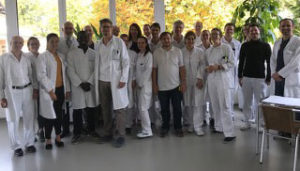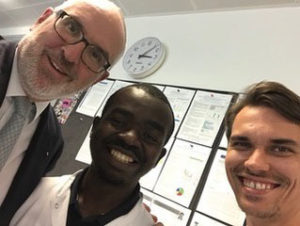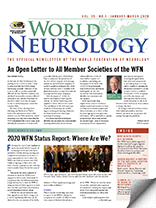By Michel K. Mengnjo, MD
I was delighted when I was accepted for the WFN travel fellowship to Christian Doppler Clinic (CDK) at the Salzburg University teaching hospital in Austria. My gratitude goes to the World Federation of Neurology, the Austrian Neurology Society (OEGN) as well as Prof. Alfred K. Njamnshi, my head of internship program in Cameroon, and Prof. Eugen Trinka for facilitating this fellowship.

Initially programmed for the Medical University of Innsbruck, I was later sent to Salzburg. Upon arrival, under the keen and permanent assistance of Hanna Vlogger (which I kindly extend my heartfelt gratitude for her availability and prompt reaction), I settled into the hostel, working on my learning objectives and anxiously reflecting on what awaited me the next day.
During the first week at CDK Salzburg, I was welcomed by the administration and immediately given the necessary orientation. I joined the residents and specialists in the ward rounds. During this week, I dedicated myself to getting more orientation and acquaintance with the residents, specialists, nurses, technicians, and neuro-rehabilitation assistants. I was taken by a kind and welcoming resident with whom we are good friends already (Dr. Matthias Mauritz) to the neurophysiology labs, the neuro-intensive care unit (NeuroICU), the invasive monitoring units, neuro-interventionists theatre, and introduced to all of the personnel.
The hospital internship ran from 8 a.m. to 4 p.m. daily, and with a much greater interest in stroke care and epilepsy. I participated in the daily ward rounds in the stroke unit, the radiology conference (for the interpretation of neuroimaging) after which I participated in the neurosonography unit for carotid Doppler and transcranial Doppler ultrasounds.

Indeed, I was in the Christian Doppler Clinic. The name sounded familiar; back in my college years, we were taught the Doppler effect in physics and mathematics. Yes! I was in a hospital named after Christian Andreas Doppler (Nov. 29, 1803-March 17, 1853) the Austrian mathematician and physicist who is celebrated for his principle known as the “Doppler effect,” that the observed frequency of a wave depends on the relative speed of the source and the observer. This theory is widely used all over the world in different domains and in the application of neurosonography (carotid Doppler US and TCD). This served as further encouragement for me to embark on stroke care management, and I was bent on learning how to perform carotid and transcranial Doppler US in a hospital named after this renowned scientist.
Fair enough, I couldn’t afford to leave this renowned hospital without acquiring these skills. Moreover, I was privileged to assist in one of neurointerventions (carotid stent placement and endovascular intra-aneurysmal coiling) by Prof. Monika Killer-Oberpfalzer, who taught me some aspects of neurointervention as part of the management of stroke.
In addition to the acquisition of experience in the stroke unit, I also went to the EEG lab to improve my skills in EEG interpretation under the supervision of Drs. Giorgi Kuchukhidze and Alexandra Rohracher who gave me useful tips and checklists to ease interpretation. My scope of knowledge on epilepsy management was expanded during the weekly epilepsy conferences where epilepsy cases were discussed among a multidisciplinary panel of neurologists, neurosurgeons, neuroimaging specialists, neuropsychologists, neuroradiologists, and neuro-rehabilitations specialists on the integrated up-to-date management of mostly refractory epilepsies. This multifaceted manner of epilepsy was intriguing to me.
Even though we are faced with numerous challenges in Africa, such as insufficient infrastructure, technical, and human resources, I think and remain optimistic that what I have acquired could be used to formulate and adapt to our settings in order to improve the quality of care in Africa and Cameroon in particular. My interest so far in stroke medicine and epilepsy has been fueled by my stay here, and I hope to acquire more skills in these two domains in the future.
I would like to humbly acknowledge the totally different spectrum of neurological disorders between Cameroon and Salzburg with a predominance of neuroinfections and epilepsies in the former compared to neurodegenerative and neuroinflammatory diseases in the latter. I wish to recommend and encourage that an exchange fellowship be done for neurologists from countries with low prevalence of neuroinfectious diseases to WFN collaboration centers in Africa and vice versa to expand our scope on neuropathologies and its management. It will be with great joy to receive them, and I am confident that this action would be considered in the nearest future as this will pave the way for future collaborations and joint research projects.
My stay in Salzburg was one full of rich memories, both socio-culturally, academically, and professionally. My thanks go to the Prof. Eugen Trinka, Drs. Slaven Pikija, Giorgi, Matthias, Nelel Bubel, Andreea Toma, Ivan Uradnicek, Eirini Mylonaki, and many more for easing my understanding, and sometimes translating the scientific presentations in a predominantly German language. This language, though a challenge for me in the beginning, became more and more fascinating and easy to comprehend. Once more, I say thanks to them for their companionship and assistance during my stay. Salzburg filled me with her history. Literally, the “Salt Fortress” and the birthplace of the famous composer Wolfgang Amadeus Mozart (which I had the opportunity to visit), the famous Mirabel Palace and its gardens best known because they famously starred in “The Sound of Music” during the scene in which Maria and the von Trapp kids danced around its Pegasus Fountain, singing “Do-Re-Mi.”
Once more, my humble appreciation goes to the WFN, OEGN, and the Christian Doppler Clinic Salzburg for granting me this opportunity. My gratitude goes to Prof. Eugen Trinka for accommodating me into his health facility and for his assistance through his team of neurologists whom I cherish and admire.
